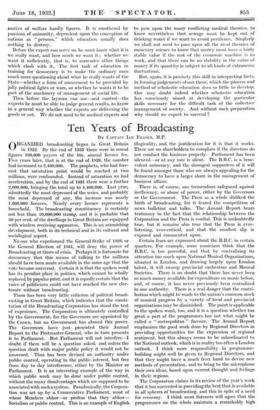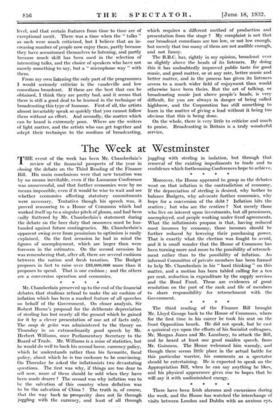Ten Years of Broadcasting
BY CAPTAIN IAN FRASER, M.P.
ORGANIZED broadcasting began in Great Britain in 1922. By the end of 1923 there were in round figures 160,000 payers of the 10s. annual licence fee. FiVe years later, that is at the end of 1928, the number had increased to 2,400,000. The prophets, who had fore- cast -that saturation point would be reached at two millions, were confounded. Instead of saturation we had acceleration, and by the end of 1931 there were a further 2,000,000, bringing the total up to 4,400,000. Last year, admittedly the most depressed of the series, and probably the most depressed of any, the increase was nearly 1,000,000 licences. Nearly every licence represents a household. The broadcasting constituency is certainly not less than 20,000,000 strong, and it is probable that 50 per cent. of the dwellings in Great Britain are equipped with wireless receiving apparatus. This is an astonishing development, both in its technical and in its cultural and `sociological aspect.
No one who experienced the General Strike of 1926, or the General Election of 1931, will deny the power of Broadcasting at times of crisis. Perhaps it is fortunate for democracy that this means of talking to the millions should have been made available in the same age that the vote became universal. Certain it is that the spoken word has its peculiar place in politics, which cannot be wholly replaced by popular print, and it is equally certain that the voice of politicians could not have reached the new elec- torate without broadcasting.
There has been very little criticism of political broad- casting in Great Britain, which indicates that the consti- tution of the Broadcasting Corporation has stood the test of experience. The Corporation is ultimately controlled by the Government, for the Governors are appointed by the Crown, but no Government has abused this power. The Governors have just presented their Annual Report to the Postmaster-General, who in turn presents it to Parliament. But Parliament will not interfere—I doubt if there will be a question asked, and unless the question dealt with major public policy it would not be answered. Thus has been devised an authority under public control, operating in the public interest, but free from day to day interference, either by the Minister or Parliament. It is an interesting example of the way in which public work may be done under public control, without the many disadvantages which are supposed to be associated with such a system. Paradoxically, the Corpora- tion was set up by a Conservative Parliament, most of whose Members abhor—or profess that they abhor— Socialism or public control. This is an example of English illogicality, and the justification for it is that it works. There are no shareholders to complain if the directors do not conduct the business properly. Parliament has been silenced—or at any rate is silent. The B.B.C. is a bene- volent autocracy, and the strongest supporters of it will be found amongst those who are always appealing for the democracy to 'have a larger share in the management of business affairs.
There is, of course, one tremendous safeguard against inefficiency, or abuse of power, either by the Governors or the Government. The Press as a whole disliked the birth of broadcasting, for it feared the competition of news bulletins and talks. The Annual Report bears testimony to the fact that the relationship between the Corporation and the Press is cordial. This is undoubtedly true, but it remains also true that the Press is ever- listening, ever-critical, and that the smallest slip is exposed and commented upon.
Certain fears are expressed about the B.B.C. in certain quarters. For example, some musicians think that the B.B.C. is too powerful, and that by centralizing its attention too much upon National Musical Organizations, situated in London, and drawing largely upon London talent; it will swamp provincial orchestras and Musical Societies. There is no doubt that there has never been so much money available for expenditure on music before, and, of course, it has never previously been centralized in one authority. There is a real danger that the contri- bution which might be made to the nation's common stock of musical progress by a variety of local and provincial organizations may be diminished. The point is applicable to the spoken word, too, and it is a question whether too great a part of the programmes has not what might be called a " metropolitan " flavour. The Annual Report emphasizes the good work done by Regional Directors in providing opportunities for the expression of regional sentiment, but this always seems to be subordinated to the National outlook, which is in reality too often a London outlook. I think more responsibility in programme- building might well be given to Regional Directors, and that they might have a much freer hand to devise new Methods of presentation, and to bring to the microphone their own ideas, based upon current thought and feelings in their regions.
The Corporation claims in its review of the year's work that it has succeeded in providing the best that is available in all spheres of broadcasting, and this in spite of a need for economy. I think most listeners will agree that the programmes on the whole maintain a remarkably high
level, and that certain features from time to time are of exceptional merit. There was a time when the " talks " as such were much criticized, but I believe that an in- creasing number of people now enjoy them, partly because they have accustomed themselves to listening, and partly because much skill has been used in the selection of interesting talks, and the choice of speakers who have not merely something to say, but a " microphone way " with them.
From my own listening the only part of the programmes I would seriously criticize is the vaudeville and low comedians broadcast. If these are the best that can be obtained, I think they are pretty bad, and it seems that there is still a good deal to be learned in the technique of broadcasting this type of humour. First of all, the artists almost invariably speak so quickly that you cannot follow them without an effort. And secondly, the matter which can be heard is extremely poor. Where are the writers of light matter, and the artists who can get together and adapt their technique to the medium of broadcasting, which requires a different method of production and presentation from the stage ? My complaint is not that our broadcast comedians are too low, or not low enough, but merely that too many of them are not audible enough, and not funny.
The B.B.C. has, rightly in my opinion, broadcast ever so slightly above the heads of its listeners. By doing this it has undoubtedly improved public taste for good music, and good matter, or at any rate, better music and better matter, and in the process has given its listeners access to a much wider field of enjoyment than would otherwise have been theirs. But the art of talking, or broadcasting music just above people's heads, is very difficult, for you are always in danger of being called highbrow, and the Corporation has still something to learn in the matter of giving a lead without it being too obvious that this is being done.
On the whole, there is very little to criticize and much to praise. Broadcasting in Britain is a truly wonderful service.









































 Previous page
Previous page